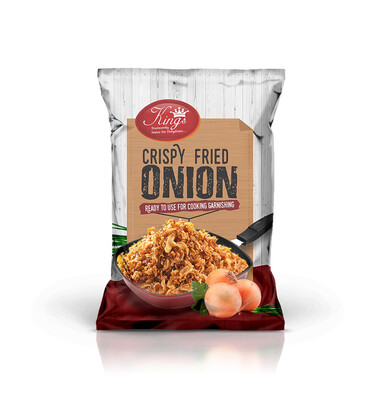Onions are the most versatile ingredients found in every kitchen. They are used in every dish or in curries to add a spicy kick and depth or a crunchy, fried topping for biryani. Buy the best crispy onion garnish as they easily mix with different flavours and add their distinctive taste that sets your dish apart. They are popular as a cooking ingredient, but they are also widely known for their healing properties. They are also a good source of biotin and contain other essential micro-nutrients such as copper, vitamin C, manganese, folate and potassium. While you may have known all of this, there’s much more to explore with this extremely useful ingredient.

For some people, every kitchen must have milk, eggs and bread. For some, the kitchen isn’t complete unless it has onions, garlic and rice. Here are six surprising benefits of eating onions that no one probably told you.
Adds unique flavour:
Fried onions add texture and flavour to food items, either complementing it as the base of a rice or noodle dish, a soup or whether they are used as the main ingredient. Buy the best crispy onion garnish to enjoy a spicy flavour if eaten raw in a salad. Onions are characteristic in Asian kitchens, and Asian food dishes are soulless without onions.
Use fried onions whenever you please:
Fried onions can make every dish better, and when you portion a batch into your freezer, you are setting yourself up for future culinary success. No need to mention, you’ll save lots of time by having the fried onions on hand, so your food preparation is already off and running. Make sure the containers where you store your onions are meant to be used in the freezer. You can freeze your melty, silky, sauteed onions in an ice tray for perfectly sized portions to cook with; then you can move the cubes into a freezer-safe container. You can use your batch of onions time and time again if you take a little time to turn the fried onions into onion powder. Use the resulted product to season meats, roasted vegetables, stews, and more.
Other essential tips:
How to Buy: Choose onions that are dry and firm. The outer layer should have a dry crackly feel and shiny appearance. The onions should not have any soft spots or show signs of sprouting, which are a sign of rotting. Dark patches on the skin of onions may be a sign of mould. Try to avoid onions with green areas, which can have an off-taste. The onion should have a mild odour. Any strong smell may be a sign of rotting. If purchasing onions sold in packets, check all the onions for signs of rotting, sprouting, or bad spots.
How to store: Onions should be stored in a dry, cool area out of direct sunlight. The location should also have good air circulation. Do not keep with potatoes because the potatoes will give off moisture and even an ethylene gas that will make the onions to spoil faster. Always place the onions in a single layer with enough room between each for proper air circulation. Under appropriate conditions, storage onions can be stored for up to two months. All cut onions with leftover portions can be wrapped tightly and stored in the refrigerator for up to 4-5 days. Store cooked onions in a plastic container or airtight glass. Do not store in a metal container as the metal can discolour the onions.
Why are onions good for you?
Onions are wealthy sources of sulphur compounds and antioxidant flavonoids like quercetin, which protects us against cell damage. Peel off the paper layer only when preparing, as these flavonoids are most concentrated in the onion’s outer layers. According to some research quercetin’s anti-histamine effect can help ease symptoms of allergies and asthma. Onions are also one of the wealthiest chromium sources, a metal that increases insulin action and helps control blood sugar levels.
Onion contains chemicals that reduce swelling, minimize lung tightness in people with asthma, and reduce cholesterol and sugar levels in the blood.
Onions contain a mixture of minerals and oils that work to break down fat deposits and also speed up metabolism. They are low in calories too; just 60 calories in a cup of chopped onions.
Onions can reduce inflammation in the body. Often inflammation in the body is caused by a build-up of oxidized fatty acids, and there are many enzymes in onions that prevent the oxidation from occurring.
Where to buy and what to pay?
Onion prices vary widely. Usually, loose ones are cheaper than packed, but not always, so check what you’re paying for. Large onions sold singly, or in bags, always carry a significant premium, as do insipid varieties marketed as mild.